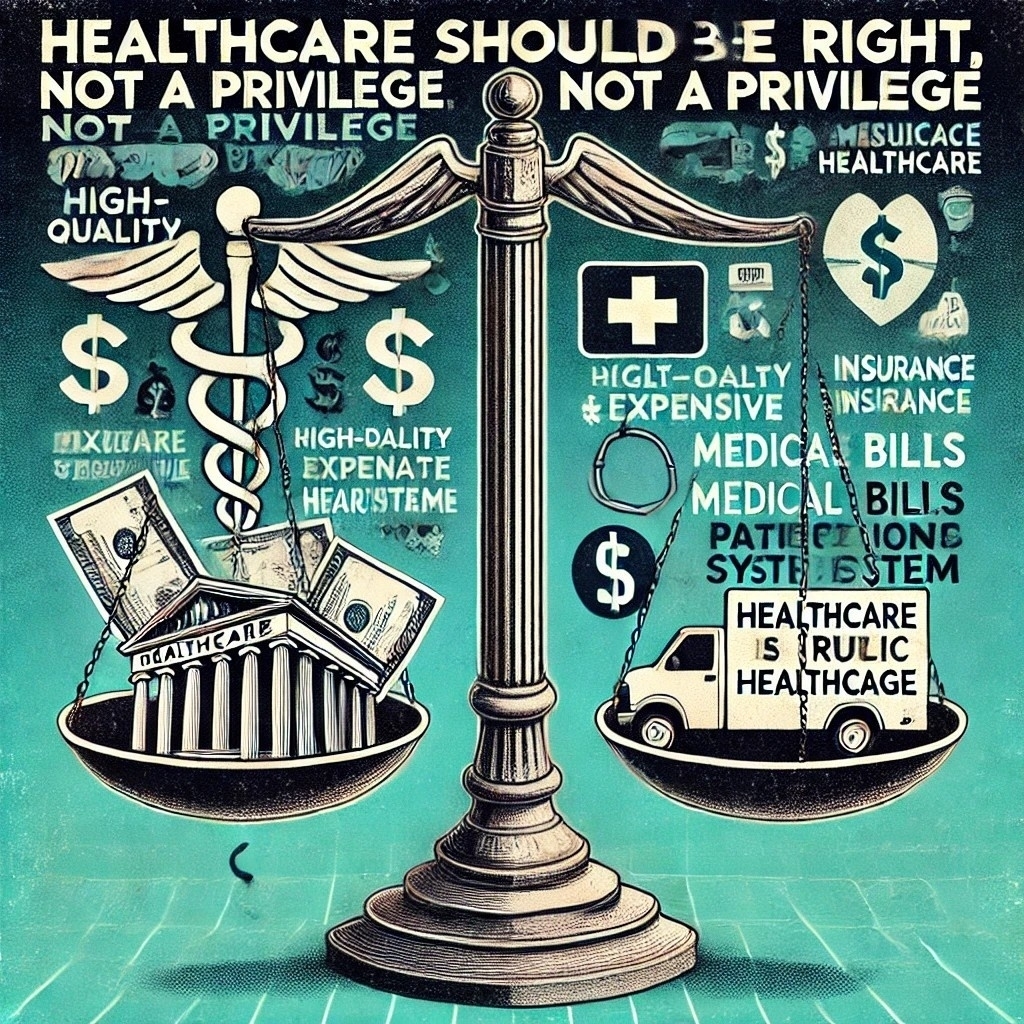Healthcare Should Be Universal

Employee-Provided Healthcare
I've been wanting to write about this topic for a while, but the December 2024 killing of UnitedHealthcare CEO Brian Thompson allegedly by Luigi Mangione has been weighing on my mind. First and foremost, healthcare in this country has been in shambles for a long time.
Throughout my career, I've always had employer-provided healthcare—through two government employers (state and county) and one private employer. I can say that the state-provided plan was the cheapest but middle-of-the-road in terms of quality. The county government plan was a little more expensive, but it was by far the best coverage I've ever had. Now, I work for a private employer, and while I'm grateful to have insurance, it has been the worst plan I've ever had—and I work for a hospital.
All three employer-provided plans I've had were self-funded but administered by private companies. The prescription coverage across all of them was terrible, though the county plan was the best of the three.
Currently, my employer switched from Aetna to UMR (a UnitedHealthcare subsidiary) for administering our plans. When I first started at the hospital, we had straight UnitedHealthcare for about two or three years, then switched to Aetna for the next ten years. Now, for the past couple of years, we've had UMR. Every year, the insurance has gotten worse. When I first started working, my insurance covered 90% of costs, and I had to cover 10%. Now, my employer only covers 70%, and we have to pay 30%.
Lab work used to be fully covered under all my previous plans, including this employer's older plans. But now, we have to pay 30% of lab costs out of pocket.
My father had insurance for both himself and my mother, and before he retired, their plan was the worst I had ever seen. Despite the high costs, the coverage was incredibly limited. However, at least their plan covered 100% of lab work—something my current plan no longer does.
The Case for Universal Healthcare
Healthcare is one area where the United States lags behind other countries. I'm a non-party voter who tends to lean right on many issues, but when it comes to healthcare, I lean left—I believe it should be universal.
Countries like the UK, Canada, Brazil, and Chile have implemented various forms of universal healthcare, each with their strengths and weaknesses. The UK's National Health Service (NHS) provides comprehensive coverage funded primarily through taxation. Canada's single-payer system covers all necessary medical services while allowing private insurance for supplemental needs. Brazil's Unified Health System (SUS) guarantees universal access despite funding challenges, while Chile's mixed public-private system offers universal coverage with tiered options.
Of course, there are many questions: How do we pay for it? How do we solve the physician shortage? What would a functional system look like? By examining these international models, identifying what works and what doesn't, we could create a better healthcare system for the U.S.
How Do We Pay for It?
This is the biggest challenge. My idea is to take employer-provided health insurance and redirect what companies and governments currently pay for their workers into a national fund. If we combine all employer contributions, employee payments, and funding for existing programs like Veterans Affairs, Medicaid, and Medicare into a single universal healthcare fund, we could create a sustainable system.
There are, of course, other sticking points—such as coverage for treatments that some citizens and government officials may find morally objectionable, like birth control or treatments for sexual dysfunction. My proposal would allow people to purchase private insurance for these services, making them accessible without requiring government funding.
Additionally, if individuals and companies want to pay for additional private healthcare, they should have that option. A properly funded and well-organized universal healthcare system should be able to compete with private insurance. In my experience working in healthcare and observing other systems, what usually undermines universal healthcare is a lack of personnel and funding—two issues that we must address from the start.
A Broken System
As it stands, our current system is fragile and failing people. The UnitedHealthcare case highlights the extreme frustration many Americans feel toward our healthcare system. While I absolutely don't condone violence, the public reaction to this case reflects deep-seated anger over healthcare policies that prioritize profit over patient care.
Health insurance companies have faced criticism for denying coverage, implementing policies that limit access to care, and contributing to the financial burden on patients. According to the 2023 Kaiser Family Foundation Employer Health Benefits Survey, the average annual premium for employer-sponsored family health coverage reached $23,968, with workers paying nearly $6,575 of that amount. The survey also found that family coverage premiums have risen 22% over the past five years while wages only increased by 27% during the same period.1
These statistics represent real people facing impossible choices between paying for healthcare and meeting other basic needs. Insurance company policies designed to maximize shareholder value often result in restricted access to necessary treatments and medications.
This is yet another reason we need universal healthcare. Healthcare should not be a privilege for those who can afford it—it should be a right, accessible to all, regardless of socioeconomic status. Will universal healthcare prevent all suffering? No. But it would ensure that every individual, regardless of their station in society, has an equal opportunity to pursue happiness and freedom—the very ideals our Founding Fathers envisioned for this country.
The question isn't whether we can afford universal healthcare—it's whether we can afford to keep letting a broken system fail those who need it most, and whether the current employer-sponsored system is truly sustainable or affordable.
Footnotes
[1] Kaiser Family Foundation. (2023). 2023 Employer Health Benefits Survey. Retrieved from https://www.kff.org/health-costs/report/2023-employer-health-benefits-survey/
Tags: #UniversalHealthcare #HealthcareReform #EmployerInsurance